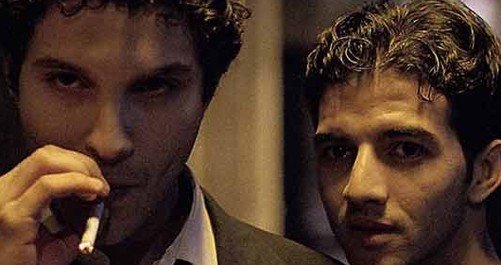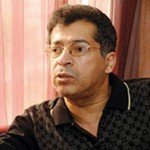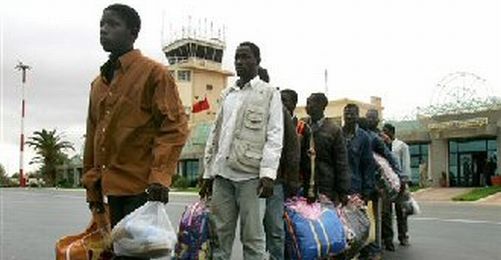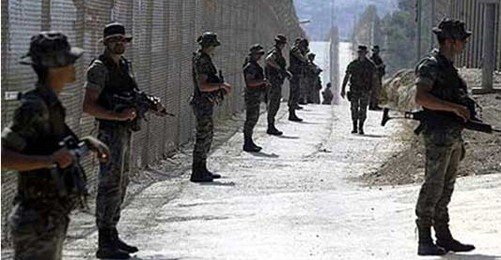"One day, your life can turn upside down. You have nothing to lean on, no certainty for the future. How can you not be pessimistic?" states Simo, 22 years old, information technology student. Morocco is a young country, very young: according to the last census, 30% of the population is less than 15 years old, 36% is less than 18 years old and more than half (51%) is less than 25. 10.4 million people, i.e. 31% of the population is between 10 to 24 years old. In big cities, young people are afraid to face the future and to find themselves in a difficult financial situation. They have lost all trust in the country's leaders...
The failure of the educational system
From an early age, they are confronted to an inadequate educational system that doesn't satisfy their needs. Amine, 22 years old, student in an engineering school in Fez considers that the system "is based on transmission of knowledge without giving any importance to the skills we can acquire". Lack of pedagogy and of motivation from the teachers' side, a programme that hasn't changed "since our grandparents", an absence of extracurricular activities... The youngsters we have interviewed complain. Wassim, 20 years old, faculty student notes that "a change of content of philosophy and history classes is needed". For Meriem, 20 years old, public school student, "the problem doesn't come from the system itself but from its executors." According to her, a good teacher is devoted to his profession and is conscious of having "a big responsibility in the forming of future generations but this is not always the case."
School drop out is the direct consequence of the Moroccan educational system's failure. According to the 2009 World Bank's report on education, only 13 out of 100 students registered in primary school obtain a high school certificate. Even worse: according to the 2005-2006 statistics of the Ministry of Education, nearly half a million (462,358) students drop out of school (primary or secondary school and high school) without obtaining any diploma. We are all aware of the consequences of this situation: under-age workers, illegal immigration, drug use and delinquency. Marwane, 22 years old, engineering student and Simo do not consider their studies "as a stepping stone for the future". Here again, figures are clear-cut: the unemployment of young people aged from 15 to 24 is approximately 16% and in cities, it goes up to 31.7%. According to the high commissioner, the unemployment rate of tertiary education diploma holders is 23.7%. This rate increases in big cities where the proportion of unemployed young university graduates is three points above the national average.
The worst thing is the persistence of long-term unemployment among this category of job seekers: four out of five graduates are unemployed for over a year. At the end of 2006, unemployed tertiary education graduates was estimated to 252,000. Mohamed, 19 years old, who did his studies in a private school confirms: "What we pay for our studies will be our first salary". This makes them dependant on their families and many are those who are afraid to "live worse than [their parents] because life is more and more expensive". In fact, the majority of the young people interviewed still live with their parents. "I live with my parents because I cannot afford to live alone. In any case, living elsewhere before I get married is out of the question," tells us Samia who works in a call centre. Living with parents requires respect for the family rules. If Samia says she dialogues with her parents, she explains that "this doesn't go beyond the limits of our society and our taboos: religion, sex and drugs". Our youngsters are in good terms with their families. They are vowed to the cult of the mother who represents a source of affection for them. Several boys, like Simo wish to "make up for the lack of communication" with their fathers who they would prefer to be more present and more open; "If I had money, I would love to send my parents to do the hajj", admits Amine. In fact, all of them reproduce the family model: getting married and having children is an objective. Mohamed thinks that "responsibilities make a real passage to adulthood". They are very pragmatic when it comes to this subject, like Hamza, 19 years old student in construction and public works: "I'm looking for the bent ennass, a girl coming from a good family who would be able to well educate our children".
All against abortion, but...
While waiting to pass this course of life, young people look for some spaces of freedom. For Mohcine, 21 years old, electrician during the day and student in an engineering school at night, "we keep away from our families in order to become more independent. Family does not teach us everything." Love and sexual experiences are good examples. "Love exists!" declares Hamza. What about sexual relations before marriage? Boys are for, while girls have different opinions according to their social and cultural background. For Meriem, "the body is fulfilled and it's an experience that contributes a lot to a couple's life". They try to get informed on the subject, either on the Internet or through discussions with friends and close family members. They're not against sexual education lessons but "not in the presence of boys", confirms Samia. Nonetheless they are not very familiar with the different means of contraception even if they are aware of their importance. They are all against abortion but "it's a crime that can be necessary", sighs Meriem. Nobody condemns cohabitation but no one plans it in the future. For others, independence education is achieved through the experience of drugs. A lot are those who consume drugs: hash, alcohol and tobacco. In general, their consumption is controlled, like Marwane who says that he smokes hash and drinks "to relax and get rid of everyday's pressure." Or like Wassim, "just for fun". There are conscious that this is dangerous for their health and the majority think of quitting. "Llah i3fou 3liya (May God help me quit)!" sighs Hicham, 20 years old, student in journalism who has been through an unsuccessful detoxification therapy to free himself from cocaine: "I just cannot do without. It's to get away from this world and from my thoughts". A National Centre for Research and Prevention of Drug Addiction (Centre national de prévention et de recherche en toxicomanie - CNPRT) was created in 2000 at Arrazi Hospital in Salé. This centre welcomes hard drug addicts but also patients who are addicted to cannabis or alcohol.
Our young people consider themselves as modern but when they are asked "are you modern?" some of them hesitate before answering. However, Amina, 24 years old, waitress in a café replies tit for that: "It's not because I wear a djellaba that I have my grandmother's mentality!" For Meriem and Samia, modernity is "openness and access to information". They all have a mobile phone, "a necessity" and if they don't have internet at home, they go to the internet café on dating or social networking websites like Facebook or Messenger. Tradition remains quite important to them. "It's good to be modern but Islam is more important", thunders Rachid, 23 years old, taxi driver. In fact, in general, they don't really like to discuss religion. Between their desire to be modern and their attachment to traditions, their behaviour is sometimes contradictory. Amine is devoted and prays but he doesn't disdain alcohol. For him "it's normal". While some plead for the legalisation of cannabis "because it would benefit the country's economy" like Hisham, others are against "because it is Haram (prohibited by Islam)". And yet, our interviewed youngsters are not extremists. "We are all against fundamentalism," explains Marwane. "Ben Laden doesn't know what Islam is". They rather approve El Qadaraoui, "because he uses words: it's a stronger arm", thinks.
They say they're not racist, neither towards Blacks, nor towards Jews. But the hachak persists and a few, like Rachid, do not make a difference between Jews and Israelis. However, they're all homophobic especially for religious reasons: "Religion strictly prohibits these kind of things," explains Simo. They lack information on notions that are highly linked to modernity such as globalisation that they sum up to telephone and internet. Secularity? "What is it?" they all ask before approving. While they are several to take the Moudawana reform into consideration and to regret "that it did not change anything yet". Like Meriem, none of the interviewed youngsters are in the know of the nationality code that allows Moroccan women to transmit their nationality to their children.
"H. M. king M6 », star of the young ...
"I'm interested in politics because they decide of the country's future but I don't vote because politics are corrupted" declares Marwane. However, rare are the youngsters who are really interested in politics and even those are a little interested do not go to vote. This is proven by the weak rate of participation to the last elections in September 2007 where not more than 37% of Moroccan went to vote. The survey published by Daba in 2007 reveals that the majority of Moroccans do not feel like joining a political party. Our youngsters have lost all trust in the Moroccan political system. Some of them state that "politics lead to prison" and that "walls have ears". What about political parties? For Samia, they are "inactive pawns that are only interested in their own interests and not in the interests of the people. They make unkept promises".
The survey carried out in 2007 by Chouala Association for Culture and Education entitled "expectations and representations of young people for good governance of public affairs" shows that young people are sceptic vis-à-vis political parties. 73% of the investigated have no sympathy for a political party and 52.7% have a very negative image. What about Parliament? For Simo, it is "A dormitory for men who don't have time to rest as they think too much of collecting money", and for Amine, "his Majesty's pawn".
Chouala's survey comes to the same conclusions: in fact, only 19% of them find the evaluation of the work of parliament members satisfying. They favourite political personality: "H.M. The King M6 and his late father Hassan II". The monarchy has their favours indeed: "It's a good thing, otherwise, since our people is made up of different tribes, a big disorder will reign" states Meriem. Even if according to Hichem, "the King's friends take advantage of the situation." This generalised mistrust is also present among unions and associations: the majority mix them up with political parties and think, like Marwane, that civil society "is used to serve politicians or to make money". In fact, a survey carried out by the ex-National Council for Youth and the Future (Conseil National de la Jeunesse et de l'Avenir - CNJA) reveals that "hardly 4% of youngsters join one of several associations" and that "young members are mainly interested in leisure associations." Nonetheless, others, like Simo, are interested and would like to commit themselves "to an action of general interest".
In spite of their difficulties, none of our young city dwellers plan to emigrate. "Going away to study, yes", confirms Mohamed. But no to illegal immigration which is "a physical and moral suicide" for Hicham. "We want to see a developed Morocco like Europe. The country is beautiful, it's the leaders who are rotten", concludes Meriem. If the youth of the 1980's and 90's dreamt of Europe as an El Dorado, the generation that grew up under the Mohammed VI era finds itself confronted to a difficult reality and a West that has lost all its attraction...







